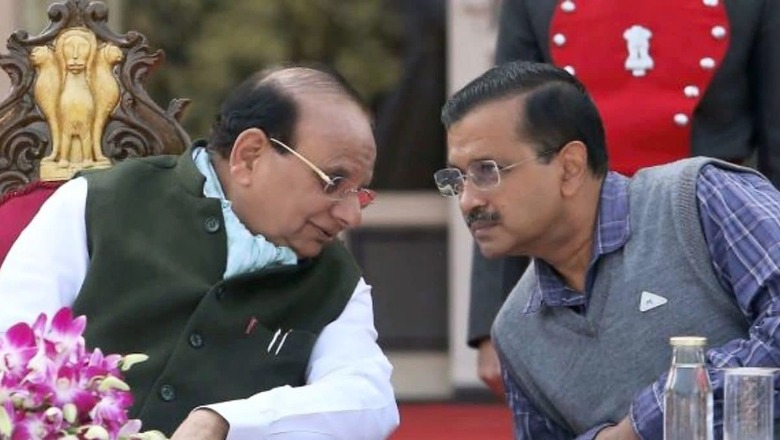
views
The Centre’s ordinance, which has shifted the scale of power in favour of the Lieutenant Governor of Delhi in matters related to services in Delhi government, is “justified” as the recent Supreme Court judgment had pointed to the absence of such a law, government sources have told News18.
The AAP government has severely criticised the new ordinance which negates the SC judgment dated May 11 that said the Delhi government would have the final say in the matter of ‘services’ and transfers and postings of officials. Government sources, however, say the Supreme Court, in para 95 of the same judgment, said if a law was brought by the Centre, the powers of the L-G can be modified. The Centre brought an ordinance to that effect on Friday, the sources said.
“The executive power of GNCTD extends to all subjects on which its Legislative Assembly has power to legislate. The legislative power of the Union extends to all entries under the State List and Concurrent List, in addition to the Union List. The executive power of the Union, in the absence of a law upon it executive power relating to any subject in the State List, shall cover only matters relating to the three entries which are excluded from the legislative domain of NCTD. As a corollary, in the absence of a law or provision of the Constitution, the executive power of the LG acting on behalf of the Union Government shall extend only to matters related to the three entries mentioned in Article 239AA(3)(a),” the SC judgment said.
But it further said: “If the Lieutenant Governor differs with the Council of Ministers of GNCTD, he shall act in accordance with the procedure laid down in the Transaction of Business Rules. However, if Parliament enacts a law granting executive power on any subject which is within the domain of NCTD, the executive power of the LG shall be modified to the extent, as provided in that law.”
This is what is being cited by the Centre to bring in an ordinance on Friday that has altered the powers of the L-G. The ordinance sets up a permanent authority headed by the Delhi chief minister along with chief secretary, Delhi & principal secretary (home), Delhi, to make recommendations to the L-G regarding matters concerning transfer posting, vigilance and other incidental matters.
It says all matters required to be decided by the authority shall be decided by majority of votes of the members present and voting — the implication is that the two bureaucrats can together overrule the chief minister. The recommendation then goes to the L-G. The ordinance says in case of difference of opinion between L-G and the ‘authority’, the decision of the L-G will be final.
The fallout of the ordinance hence is that the L-G remains supreme, the SC judgment stands negated and the Delhi chief minister’s powers have got weakened.
Government sources said the Supreme Court judgment hits at and contravenes the very idea of India as envisaged by the Constitution and flouts the basic structure doctrine. The Centre has filed a review petition against the judgment too.
“Article 1 of the Constitution of India defines the territory of India as comprising of States and Union Territories, and nothing else. By implication it provides for the Union Territories to be governed solely by the Union. The Constitutional Bench Judgement flouts Article 1 of the Constitution of India that defines the territory of India as comprising of States and Union Territories, and nothing else, by inserting a special ‘sui generis’ (a unique new class) category for Delhi,” a government source said.
Sources added that in defining this ‘sui generis’ – new and unique status of Delhi — the court has created a new class of territory that did not exist till now and is contrary to the constitutional provisions.
“Even if one were to agree that Delhi’s status is ‘sui generis’, it cannot be taken away that it remains a Union Territory. This status of Delhi as Union Territory (UT) is by deliberate constitutional design. Its status as an UT and as the capital of India, calls for governance by the Union of India, rather than any other entity,” government sources said.
Sources said that Article 239AA of the Constitution that provided an assembly to Delhi was meant to address local aspirations and in no way intended to give over riding control of the UT to the local government, over the existing control of the Union Government.
Part XIV of the Constitution expressly provides for ‘Services’ to be within the domain of the Union or the States and not UTs, sources said. “By giving the control of ‘Services’ to the Government of UT of Delhi, and by implication treating Delhi as a State, the SC order is contrary to the basic structure of the Constitution. The Constitution specifically provides for division of powers between the Union and States. It gives exclusive powers to the Union as far as UTs are concerned,” the sources said.
They added that the SC judgment “expressly and effectively derogates” the Office of the Lt. Governor, and by implication that of the President of India, as defined vide Article 239 of the Constitution.
“The Constitution deliberately provided for the Lt. Governor to be the Executive Head and Administrator of Union Territories, unlike Governors of States. In giving Executive Powers to the Lt. Governor, unlike the Governors of States, the Constitution, by design did not provide the immunities provided to Governors of States. It was Constitutional design for the Lt. Governors to hold Executive Powers on behalf of the Union and therefore, be more ‘powerful’ than the Governors, in effect. The CB judgement has struck at the letter and spirit of the Constitution in equating the LG with Governors by binding him with aid and advice of the Council of Ministers in the matter of ‘Services’ that can only belong to the Union,” government sources said.
Sources also claimed that the judgment contravenes the basic time tested principle of Legislative Authority being co-existent with Executive Authority. “It means that a government will have Executive Powers only on matters and subjects upon which, it can also legislate. The CB Judgement, gives the power to legislate in matter of ‘Services’ pertaining to the UT of Delhi, to the Parliament of India. However, it paradoxically and unconstitutionally gives the Executive Powers of control over the ‘Services’ to the Government of UT of Delhi, by taking them away from the Union Government,” the sources said.



















Comments
0 comment